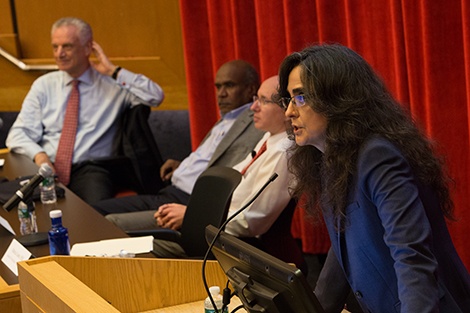Climate change may lead to an increase in malaria in certain spots around the world. But in other places, it may have little or no impact on the mosquito-borne disease, according to an expert panel convened at Harvard T.H. Chan School of Public Health.
Temperature and precipitation changes driven by climate change aren’t the only factors influencing malaria transmission, said the speakers at the Oct. 23 event, held as part of Harvard Worldwide Week. (Read about another Harvard Worldwide Week program on malaria eradication approaches.) Other factors include government programs to prevent transmission, preparedness for outbreaks, population size, and acquired immunity levels among populations, and those vary from nation to nation and region to region.
And given the fact that climate change is politically controversial, it’s crucial for scientists to consider all available data and to communicate clearly about the complex interplay between climate and other factors in shaping disease trends, said Marcia Castro, associate professor of demography at Harvard Chan School. If scientists present conflicting information, “climate deniers make a feast of this,” she said.
Others who spoke at the event—titled “The Effect of Shifting Global Health & Climate Change Policies on Malaria Eradication”—included Aaron Bernstein, associate director of the Center for Health and the Global Environment; Alan Court, senior advisor, United Nations Secretary General’s Special Envoy for Health in Agenda 2030 and for Malaria; and Elfatih Eltahir, Breene M. Kerr Professor of Hydrology and Climate at MIT.
Eltahir, an expert in hydrology and climate, discussed studies conducted in several locations in Africa in which researchers examined a host of variables—such as precipitation, temperature, altitude, the mosquito life cycle, and patterns of water availability that could influence mosquito breeding—in order to create computer models predicting future malaria transmission. He noted that, in some locations, climate change is expected to produce wetter weather—which could help mosquitoes breed—but that temperatures are also predicted to increase, which could harm mosquitoes. In essence, these two effects could cancel each other out, resulting in either similar or even decreased levels of malaria in parts of Africa. “In general, the story of climate change and malaria in Africa is not a terribly bad story,” Eltahir said.
In response to audience questions about the difficult politics surrounding climate change, Bernstein acknowledged that the Trump administration is not taking climate change seriously. But he pointed out that Europe, as well as a number of U.S. states—including economic powerhouse California—are bolstering efforts to reduce carbon emissions. “There’s a very good chance that the global economy is going to be taking an irretrievable move toward decarbonization,” he said. “The good news is that the momentum for most the world community is in that direction.”






